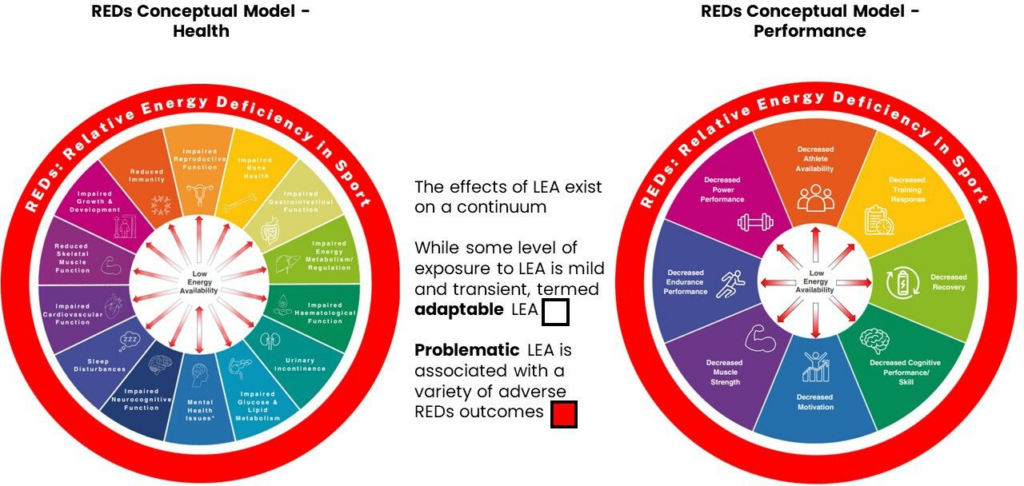Low Energy Availability (Relative Energy Deficiency in sport)
A lot of athletes struggle with organization, food preparation, and time management which results in food being pushed to the side or forgotten. That can lead to ignoring hunger signals and low energy intake in athletes. When this happens for a few consecutive days, performance starts to decline due to low energy availability (LEA) in the body. The term for this is Relative Energy Deficiency in Sport or RED-s. This is harmful to the body as it effects all our organs! You are at a higher risk for stress fractures, loss of menses, decrease in testosterone, decrease GI function, increased stress on the heart, and negative impact on sleep.
If you are someone who is struggling with Low Energy Availability (LEA), the key is being intentional and focusing on fueling. If you notice that adding back in food isn’t that easy for you or
that you are experiencing a lot of guilt, shame or fear. You may be struggling with disordered eating or an eating disorder. But, if you notice this isn’t occurring you probably fall into the RED-s category. For more information about increasing food intake to meet your energy needs, check out BUILDING A CONSISTENT EATING PATTERN

2023 International Olympic Committee’s (IOC) consensus statement on Relative Energy Deficiency in Sport (REDs)
Disordered Eating in an Athlete
Disordered eating starts to happen anytime diet culture seeps into our thoughts. This can look like the world around us constantly telling us we need to look a certain way, have a certain type of body, and eat only a certain type of food. This is disordered eating. Which can sit in a wide range between normal eating and an eating disorder. Typically what we see is that these behaviors are of a lesser severity or happening less frequently than with an eating disorder. You find yourself restricting food, binge eating or feeling out of control around food but it’s not happening every day or every week. But, disordered eating and eating disorders are like a snowball rolling down the hill, if not treated the problem just keeps getting bigger and more out of control. So seeking help is crucial, and sooner rather than later!

Signs you may be struggling with Disordered eating:
-Eating out has become harder and you are experiencing low energy intake
-you find when you find you feel most comfortable ordering salads or the “healthy option”
– when you order something different you feel like you are being bad
-You have created more rules around eating and feel bad, guilty, or ashamed when you don’t follow them
-You feel out of control around food when you eat, and sometimes eat until you are extremely uncomfortable
-Stopped eating before you are full but maybe you’re stopping because others tell you they are full
– Training extra on top of your sport training schedule in order to lose weight or be healthier?
-Started saying no to foods being offered because they don’t fit into the rules you have around food?
If you have identified with these, it’s time to take the next step and get the support you need! This is not how our relationship with food is supposed to be. So where do you start?
First, get support from professionals and build your team. For your team, will want your primary care provider, a therapist and dietitian that specialize in eating disorders. Continuing to fuel your body like this is only going to negatively impact your performance as well as your personal life.
Eating Disorders in athletes
Eating disorders can vary person to person and may look extremely based on the athlete. It’s also important to understand eating disorders don’t discriminate; they don’t care where you came from or who your family is. They are a mental health disease, this is why you can’t “JUST EAT MORE” to fix the problem. Diagnosed based on the DSM5 standards, the diagnostic and statistical manual for mental health fifth edition and diagnosed by your doctor, psychiatrist or therapist. If you identified with multiple of the situations listed above for disordered eating you may have an eating disorder.
It is important to understand this is not a problem you have to struggle with forever, you can recover and overcome these thoughts. Oftentimes the voice in your head that has created these rules has become so loud, and is too hard for you to fight against the eating disorder. This is where your support team comes in, to help you see that you can do this!
Other identifiers that you may have an eating disorder:
Do you make yourself Sick because you feel uncomfortably full?
Do you worry that you have lost control over how much you eat?
Have you recently lose more than 14 pounds in a 3 month period of time?
Do you believe yourself to be fat when others say you are too thin?
Eating disorders are not just individuals who are extremely thin or someone struggling with purging. They can also be individuals who are struggling with other symptoms like:
Overexercising or only eating foods that are “clean”
feeling out of control around food
having a lot of shame or guilt around your body even when your body is at its genetic size.
Tips for increasing fuel:
-Start with where you are and try to either add in a snack that has 2 items (one carb + one protein),
-Try having a few more bites of carbs at meal time, and try reminding yourself of why carbs are valuable for the body (they give it the energy you need to exist)
-Try playing a game or doing a puzzle, talking to friends or family while eating dinner
-Aim to go no more than 3-5 hours without fuel, even if you aren’t hungry. We are retraining the brain to tell you that you are hungry.
-Remember that food isn’t just for nourishment, we are designed to enjoy it too!
Want more help increasing your low energy intake? Please reach out, I am here to help. Eating disorder recovery is not designed to be done on your own, let’s set up a Free Meet n Greet